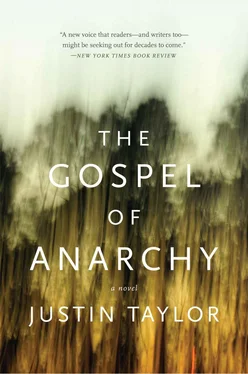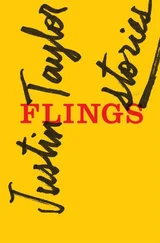The mystical stuff, the baffling Christ babble, was the one thing about Parker that Thomas was never able to comprehend — hell, could barely stomach — and from the beginning it was a wrench in the gears of their friendship. But he had the ugly example of the Palace punks to remind him of the constant dangers of prejudice, a closed mind, etc. Those miserable fuckers had really hurt his friend, who had only ever wanted one thing, which was to extend the concept of absolute freedom to include the free self’s freedom to explore faith free of oppression. What Parker objected to was throwing the whole notion of the spiritual out with the rancid bathwater of power’s general tendency to co-opt religion. Thomas didn’t agree, really, but he understood where his friend was coming from, and he furthermore recognized that his own position had — and ought to have — no bearing on Parker’s. That’s the beauty of anarchism, of anarchy. And that’s another way of saying that for Thomas, as long as Parker kept that shit to himself, which for a long time he did, the two of them got on like the brothers neither of them had ever had. Or like Thomas never had, anyway. Who can say what Parker’s family might or might not have been?
One day the two of them woke up with an itch for travel, so they packed their backpacks with dumpstered bagels and gallon jugs of water, and kissed sleepy Katy good-bye. She didn’t mind them having a little boys’ time; she wouldn’t stay lonely long. Parker and Thomas wandered out to the tracks through a warm sunrise drizzle and caught the first thing that came their way. They’d thought they were headed for South Florida, Miami Beach, maybe a little visit to Thomas’s parents’ place if their supplies ran low. Instead they spent ten hours in the skull-numbing shake of the dark boxcar, and clambered out at their first opportunity into what turned out to be the Philadelphia yards. They spent a week there, swimming in Wissahickon Creek — slimy, and the banks needle-strewn, but gorgeous anyway — and sleeping in a dry culvert they found. They dumpstered expired feasts from the Safeway, snuck in to see Hot Water Music play the Electric Factory, and made their beer money from receipt scams at Walmart, or by stealing coffee-table books from one Barnes & Noble and then returning them at another. They were invisible, invincible outlaw princes; wild children, lost boys. To this day, it’s one of Thomas’s happiest memories. Sometimes he wonders what made them hitch back to Gainesville. Couldn’t they have just gone on?
But Parker hungered for visions and trials, and there were limits on his ability to resist this urge. After Philly, he began to go off more frequently, but never again with Thomas. He sent himself alone on soul errands, into the woods now, and spoke vaguely of his travels as quests, though it was never clear what it was he quested for. Thomas nursed the hurt of rejection and consoled himself with the knowledge that, his more bizarre quips notwithstanding, Parker was still in open rebellion against the established church — every last one of them, whatever the denomination. That was good enough for Thomas, pretty much. Out there in the Coop, they led noble, satisfied lives of monkish poverty cut with the finest excesses a college town affords. But Parker’s troubled spirit was ever more difficult to ignore. He was both restive and inward-looking, and no longer wanted to go to shows or even get drunk. He allowed himself nothing but the various books he stole and all the time in the world to read them. He reread, highlighted, underlined, folded corners down, made marginal notes.
The more Parker contemplated, meditated, delved within, the less interested he became in tearing down — much less forging a humane alternative to — the capitalist-imperialist system, the lie of the American dream, or anything lasting at all. All around them he saw things crumbling, as computers translated the foundational aspects of reality — distance, presence — into illusions of themselves, even as Marx had written that all that is solid melts into air. Parker believed every new technology brought about a new kind of disaster, and therefore some critical mass or terminal velocity was inevitably bound to be reached. It was the age of Late Capital; the core was rotten; the sickness was in the blood. He dreamed of entropy, but he dreamed awake. The world was hastening its own end, and he would welcome that ecstatic unraveling when it came, but in the meantime he would have them be utopians, stand apart insofar as they were able, and push themselves always farther, further away.
Thomas already understood the basics: the capitalist war machine controls the world; voting changes nothing; democracy is a joke they keep playing on us, like the gym class bully who steals your underwear then dangles it above your head, just higher than you can reach. He knew — they all knew — that it didn’t matter which Republicrat you voted for, but Parker saw no more purpose in protest marches, peace group meetings, or whatever the campus left was hot and bothered about lately. Palestine, sexism, Greek-system domination of the student senate, union rights, Iraq sanctions, university contracts with weapons developers, or worse yet, with Nike — it would all come and go. They already lived outside capitalism’s kingdom, in the gutter that ran along the base of its fortified wall, not beyond but below the field of its vision — except of course when they got caught stealing, but they were pretty ace thieves by this point. We might be trapped in this fucked, fallen world, Parker said, but that is not the same as being of it. They were strangers passing through alien land. When Katy and Thomas professed themselves anarchists, Parker insisted that this meant they were already Christians, for in his mind the two were cut from the same cloth and together formed a single shining garment, the armor of faith.
These were the teachings Thomas rejected, and which Katy adopted with her whole heart.
The reason they live at Fishgut is Drake the junkie. He was essentially Parker’s first congregant, even before Katy. Drake was eager to pay back Parker’s kindness, besides which it didn’t take a whole lot of effort to shoot himself up and listen for however long until he nodded off. But then he went and OD’d. Wastoid. Moron. Sellout. He died right there in the Coop. Parker himself found the body: eyes open, residual warmth. And this of course brought the cops down, scattering the family to the winds.
Katy stayed with Liz at Liz’s mom’s place, under the pretext of being just another local girl with a home life approximately as fucked-up as Liz’s own. Thomas meanwhile crashed on couches, here and there, or in the back room at Clasen’s, on nights he worked closing shift. Parker stole a pup tent — the very one that stands in the yard today — from a high-end sporting goods store down Thirteenth Street. Then he fled to the woods. He lived somewhere in or near the Paynes Prairie nature preserve, but they never knew exactly. He wouldn’t show anyone.
All their situations were untenable, and several recon missions in search of fresh squats had come up empty, and living with Liz’s mom was driving both girls crazy (here they were, living together, and yet still having to sneak around), so they pooled their scrimpings and found this place. A small but necessary compromise of their values: to actually pay rent.
The landlord’s a local. Jim Stuckins. Does it get more Gainesville than that? He actually grew up in this house and owns it outright, along with three or four other places he’s picked up over the years. He hates how the realty companies level whole neighborhoods, then replace them with whitewashed buildings with stupid-ass names like Looking Glass, Nantucket Walk, and of course David’s own Gator Glen. A company had been picking up houses on the block. The plan was — perpetual plan is — get ahold of all of them, then level, then rebuild. Make it like that Pete Seeger song about the little boxes, only these would be shoe boxes, stacked in rows. “Die before I sell to them sonsabitches,” Stuckins told them, and that was good enough for Thomas.
Читать дальше












